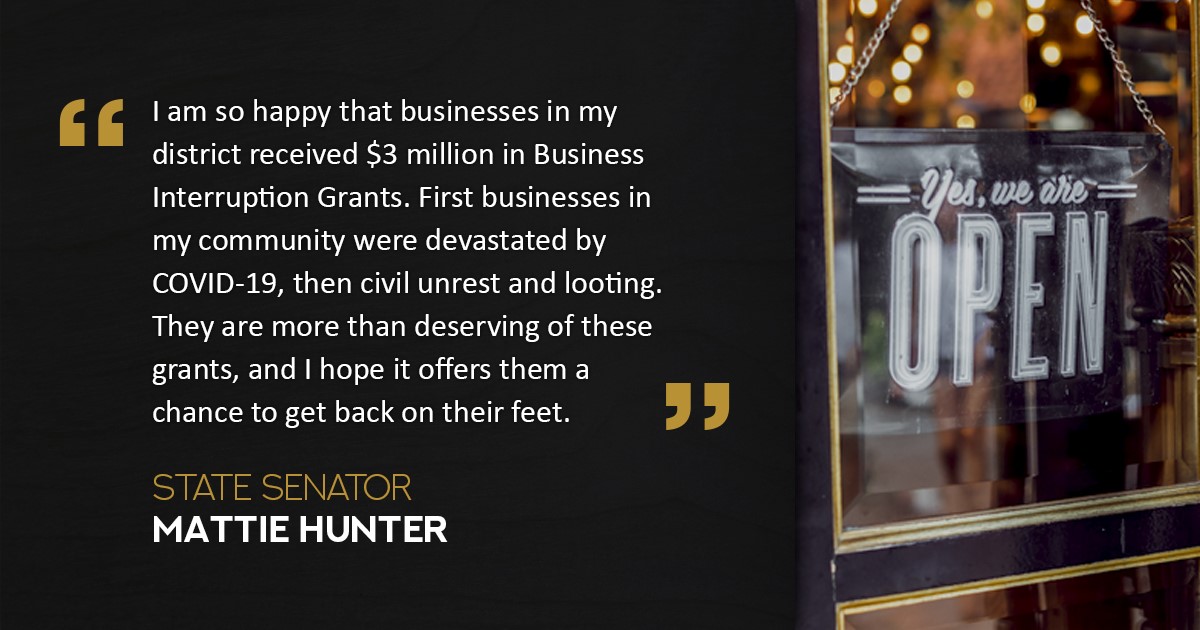- Details
- Category: News

CHICAGO – In an effort to provide support to small business owners facing economic hardship as a result of the COVID-19 crisis, State Senator Mattie Hunter (D-Chicago) announced more than $3 million in Business Interruption Grants for hundreds of businesses in her district.
“I am pleased businesses in my district received $3 million in Business Interruption Grants,” Hunter said. “First, businesses in my community were devastated by COVID-19, followed by civil unrest and looting. My heart goes out to them for all the hardships they’ve faced these past several months. People put their whole lives into their businesses, and deserve to see their hard work pay off.”
- Details
- Category: News
 CHICAGO – In light of the recent civil unrest on Chicago’s Magnificent Mile ignited by conflicting reports on a shooting in Englewood, State Senator Mattie Hunter (D-Chicago) called for more transparency and togetherness in her community at a press conference Wednesday.
CHICAGO – In light of the recent civil unrest on Chicago’s Magnificent Mile ignited by conflicting reports on a shooting in Englewood, State Senator Mattie Hunter (D-Chicago) called for more transparency and togetherness in her community at a press conference Wednesday.
“My heart is aching for my community, as the Southside, Westside and downtown areas have been struggling with looting and effects of the pandemic since May,” Hunter said. “The saddest part is – many of the looters are not even from our neighborhoods. They come from out of town, they take what they want, and the underprivileged communities get the blame.“
- Details
- Category: News
(The following op-ed from Senator Mattie Hunter was submitted to the Chicago Tribune on July 28, 2020)

For the Chicago Tribune Editorial Board to say our federal aid request had “little to do with public health” is disingenuous at best and a flat out lie at worst.
That request specifically asked for the single largest public health investment in Illinois minority communities in modern history.
It is an overdue investment.
It comes at a time when people in Black and Brown communities are being infected, hospitalized and dying at rates exceeding any other community.
It comes as a time when there is growing recognition of these communities’ economic, social and human needs being ignored decade after decade.
That’s why we sought $1 billion in public health investment targeted to these underserved, disproportionately impacted neighborhoods. We also requested hardship pay for the heroes working on the front lines against this virus in health care facilities.
The Tribune Editorial Board skipped all that.
Those are especially hard items to overlook given they were included in Tribune news coverage. Perhaps the Editorial Board should read the paper.
The Tribune Editorial Board’s views on federal relief are stunningly tone deaf at a time when millions of Illinoisans are facing unemployment, food insecurity and lingering racial divisions. I could point out the numerous errors in their argument and judgement, but that’s another letter for another time.
The Editorial Board may score political points in some circles with its finger wagging refrain. I hope it satisfies them. The rest of us will remain focused on getting Illinois through this crisis.
- Details
- Category: News

CHICAGO - As a way to help Chicago’s young adults weather the economic and social challenges caused the COVID-19 pandemic, State Senator Mattie Hunter (D-Chicago) is encouraging youth aged 16-24 to participate in the Illinois Department of Human Services’ COVID-19 Summer Youth Employment Program.
“The youth I represent have been faced with a great deal of adversity over the past few months, especially in our underserved neighborhoods. For some, it can feel overwhelming,” Hunter said. “This program offers a productive way to combat financial uncertainty while building the foundation for a great career.”
The program offers paid career development and work experience to young adults by partnering them with local employers in need of summer workers.
Providers under the program serving Hunter’s district are listed below.
|
Provider Name |
Contact |
|
Phone Number |
|
Boys & Girls Clubs Chicago |
Fannieleah Brown |
|
312-235-8000 |
|
Centers for New Horizons |
Edwin Galletti |
|
773-373-5700 |
|
Chicago Area Project |
Howard Lathan |
|
312-588-3834 |
|
Jewish Child Family Services |
Nanette Cohen |
|
312-673-2700 |
|
SGA Youth Family Services |
Jesenia Latorre |
|
312-663-0305 |
Participants in this program will be placed in age- and experience-appropriate opportunities in one of three categories: work-based learning, career development experience, or pre-apprenticeship programs that target a registered or non-registered apprenticeship.
The state has dedicated $9.3 million to the program to employ low-income youth living in areas most affected by the pandemic.
“Young people should be able to see a promising future for themselves, which is why I encourage all eligible youth in Chicago to take advantage of this opportunity to enhance their job prospects,” Hunter said.
Opportunities are available through the end of August.
###
More Articles …
Page 62 of 126

